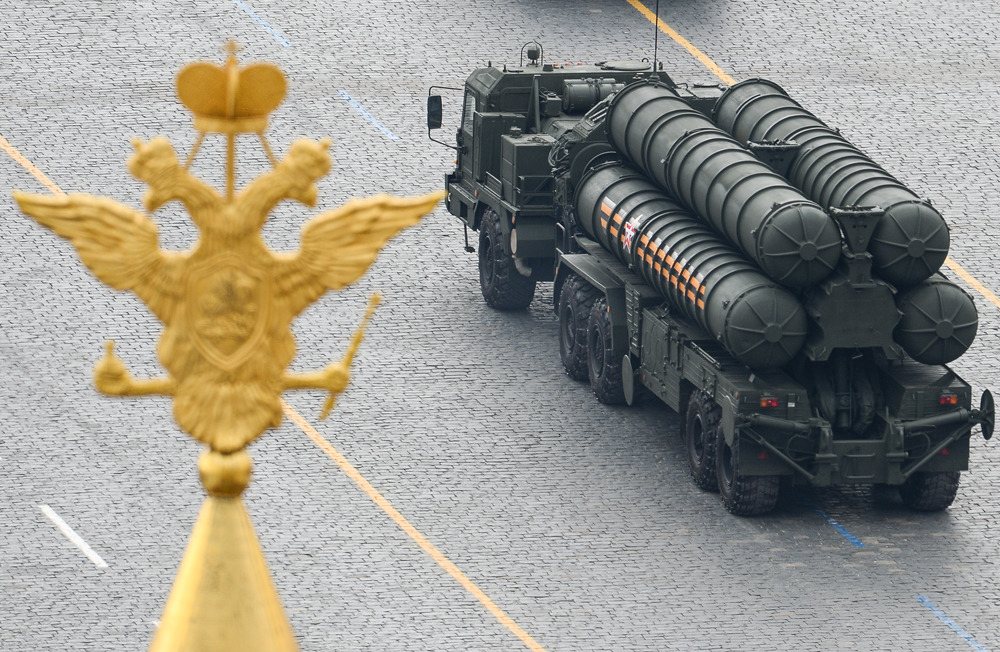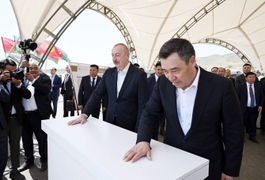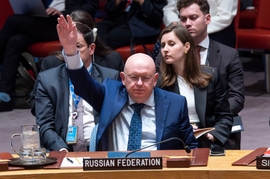Turkey and Russia have reportedly worked out a deal whereby Russia will sell its S-400 anti-aircraft system to NATO member Turkey, with Moscow paying for half of the purchase.
Victor Kladov, the Director for International Cooperation and Regional Policy for Russia’s state-owned arms manufacturer Rostec said on June 7 that Russia and Turkey had reached an agreement on technical specifications for a contract that would supply Turkey with the S-400.
The S-400 Triumf, or SA-21 Growler in NATO parlance, is a long-range surface-to-air missile system designed to destroy strategic and tactical aircraft, tactical and theater ballistic missiles, medium-range ballistic missiles and other air attack assets, at a maximum range of 400 kilometers. China and India, both clients of the Russian defense industry, own such systems.
According to a Turkish media report claiming the two sides have signed a Memorandum of Interest, Moscow and Ankara have agreed on a two-battery system with 240 warheads, and search-detection-tracking and baffle radars. The price tag of $2.5 billion will be split by Ankara and Moscow, and Turkey will receive the system within two and a half years.
Ankara has repeatedly voiced its desire to produce the S-400 on its own, but Putin believes that this is a separate issue apart from the sale of already-manufactured systems, and depends upon the readiness of the Turkish defense industry.
“We do not produce such equipment anywhere abroad,” Putin said at a press conference during the St. Petersburg International Economic Forum, held earlier this month.
The S-400, developed in the 1990s and described as one of the best air defense systems currently made, has as its main rival the American-manufactured MIM-104 Patriot missile system. Patriot missiles have a maximum range of 160 kilometers, and are used by China, Germany, Greece, Israel, Japan, Kuwait, the Netherlands, Saudi Arabia, the UAE and Spain. After North Korea test-launched ballistic missiles in the Sea of Japan and conducted underground nuclear testing in 2006, South Korea also purchased the Patriot system, from Germany.
As a member of NATO, Turkey’s interest in buying a system from the multilateral bloc’s historical nemesis may appear illogical at first, but is seemingly due to no other alternatives.
On December 4, 2012, NATO authorized the deployment of Patriot missile launchers to its member state Turkey, to protect the country from missiles fired in the civil war ravaging its southern neighbor, Syria. However, Ankara has not actually purchased the system due to its unaffordable cost and other NATO member states’ unwillingness to sell to Turkey.
“NATO countries do not share technology with us, do not put competitive prices, but immediately criticize as soon as Turkey starts to look for alternatives. They do not have this right. Our main goal, which no one can oppose, is to produce our own components for an air defense system,” Fikri Işık, Turkey’s National Defense Minister said in May.
Turkey’s purchase from Russia comes against the backdrop of a couple of years of tense relations between Moscow and Ankara, which deteriorated sharply in 2015 after a Russian Su-24M was shot down by an air-to-air missile from a Turkish F-16C fighter jet along the Syrian-Turkish border.
Ankara had maintained that the Russia jet violated its airspace, while Moscow demanded an apology and material compensation. As tension escalated, Russia banned food imports from Turkey, charter flights to and from the country, and prohibited Russian businesses from hiring Turkish nationals. Bilateral trade dropped by 32 percent to $15.8 billion in 2016, compared to just one year earlier.
Interests also clash inside Syria, where Moscow backs the regime of President Bashar Al-Assad while Ankara backs rebels fighting the encumbered Assad. Turkey and helped create the Free Syrian Army, once considered the main rebel group fighting Assad’s forces.







 Kyrgyzstan has joined the extensive reconstruction efforts in the Karabakh region of Azerbaijan, after a series of mega initiatives were launched b...
Kyrgyzstan has joined the extensive reconstruction efforts in the Karabakh region of Azerbaijan, after a series of mega initiatives were launched b...
 President Ilham Aliyev shed light on the evolving contours of the peace process with Armenia during an international conference in Baku this week. ...
President Ilham Aliyev shed light on the evolving contours of the peace process with Armenia during an international conference in Baku this week. ...
 Azerbaijan and Armenia started the process of demarcation of their border on Tuesday, with the installation of the first border markers based on ge...
Azerbaijan and Armenia started the process of demarcation of their border on Tuesday, with the installation of the first border markers based on ge...
 Iranian President Ebrahim Raisi expressed Tehran’s readiness to participate in significant development projects in Sri Lanka during the inauguratio...
Iranian President Ebrahim Raisi expressed Tehran’s readiness to participate in significant development projects in Sri Lanka during the inauguratio...
 Iran and Pakistan have signed eight cooperation documents in various fields, and agreed to strengthen ties to fight terrorism in the region.
Iran and Pakistan have signed eight cooperation documents in various fields, and agreed to strengthen ties to fight terrorism in the region.



